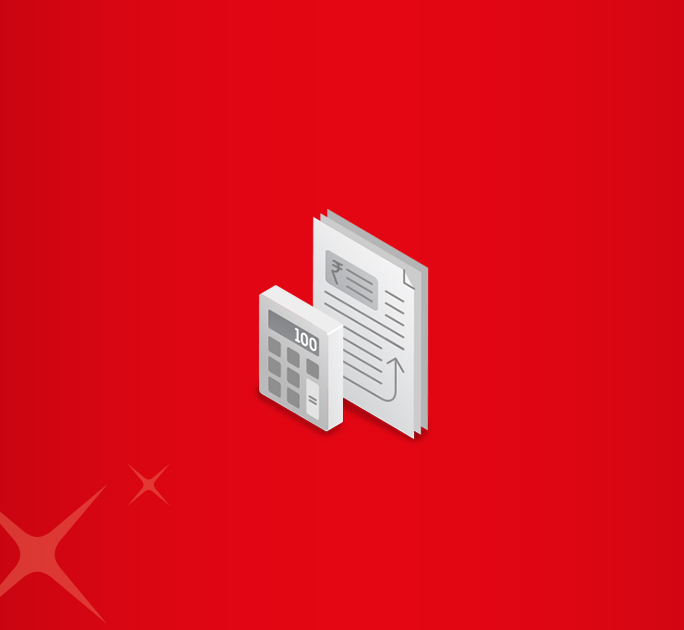- Save
- Invest
- Borrow
- Pay
- More
- NRI Banking
- Customer Services

RD Vs SIP – What Are the Differences
Risks, Returns, Tax Rates, and other differences between SIP and RDs
Key Takeaways:
- A Recurring Deposit is a type of term deposit that allows you to invest periodically.
- A Systematic Investment Plan is Way of investing in Mutual Fund schemes in instalments.
- The RD interest rates and relatively low but fixed, and you get risk-free returns.
- SIPs have the potential to offer relatively higher returns but also carry an element of risk.
- You can invest in RD monthly while you can make weekly, monthly, quarterly, half-yearly SIP payments.
Regular investments can help you build a corpus overtime. Recurring Deposits (RD) and Systematic Investment Plans (SIPs) are popular investment instruments where you can invest lower amounts over longer periods. RD is a savings scheme you can open with a bank or post office. Asset management companies (AMC) or fund houses offer SIP schemes. In many ways, RDs and SIPs appear similar. However, there are several specific differences between RD and SIP. Let us decode them in this article.
RD Vs SIP – Meaning and How They Work
An RD or Recurring Deposit is a term deposit plan or account wherein you can deposit smaller amounts on a monthly basis. RDs are offered by banks, Non-Banking Financial Companies (NBFCs) and post-offices. With RDs, you typically earn a fixed interest rate based on your chosen tenure. You can open an RD for tenures ranging from three months to five years and above.
When you open an RD account, you have to provide standing instructions to the bank to debit a fixed sum of money from your Savings Account every month. You get the interest payment, along with the amounts invested when your RD matures.
A Systematic Investment Plan is a type of Mutual Fund investment plan. You can make daily, weekly, monthly, quarterly, half-yearly or yearly investments in your preferred Mutual Fund scheme instead of a lump sum investment. Depending on the type of scheme, your fund manager invests your money in equity instruments, debt instruments or both. When comparing Recurring Deposits vs SIP, the return rates for SIPs vary per the market conditions.
You need to set up an electronic clearing service (ECS) to invest in SIPs. ECS lets the fund house deduct the preferred SIP amount from your Savings Account per the preferred investment frequency. You can start your SIPs with a minimum amount of INR 100. However, this amount may differ from one financial institution to another.
Download the digibank by DBS app to get started with your SIP.
Difference Between SIP And RD
With both RDs and SIPs, you get the benefit of making smaller investments over a longer period. However, the two products have several differences. They are listed below:
Risk & Returns
SIP returns are heavily based on market conditions and the chosen Mutual Fund scheme. You can earn higher returns during bullish markets. During such times, SIP returns outweigh RD returns. Contrarily, your SIP returns may fall during a bearish trend. One of the ways to avoid low returns is to stay invested for longer tenures.
RDs are safer investment avenues as the interest rate you earn is fixed at the time of account opening. Even if the market performs poorly, your returns are guaranteed. Thus, when it comes to SIP vs RDs, RDs are the viable investment avenues for individuals with low risk tolerance, while SIPs are ideal for those who believe in the ‘high risk, high returns’ mantra.
Investment Tenure
While comparing SIP vs Recurring Deposits, you must consider your preferred investment tenure. You can hold an RD for tenures ranging from 1 to 10 years. Conversely, SIPs offer relatively more flexibility, in that, there is no specific investment tenure. You can select Liquid Funds that you can redeem after seven days or opt for Equity Funds generating good returns, which you can redeem many years later.
Taxation
The interest income you earn on RDs is taxable per your applicable tax slab, under the Income Tax Act, 1961.
If you opt for Equity Mutual Fund SIPs, the short-term capital gains (STCG) on redeeming the investment If you redeem your investment after one year, you become eligible for Long-term capital gains (LTCG), which are tax-free up to INR 1 Lakh. You must .
In the case of Debt Mutual Fund SIPs, you must pay a STCG Tax per your income tax bracket, on redeeming your investment (partially or completely), within 3 years. Also, LTCG tax of 20% with indexation applies on redeeming investments after 3 years.
*Note that these taxation rules are subject to change at the sole discretion of the government.
Final Note
As is apparent from this comparison of SIP vs RD, both investment instruments assist with wealth creation with smaller investment amounts. As the investor, you must assess your risk profile and preferred tenures before investing. It also helps to diversify your investments and manage your risks and returns by investing in both instruments.
Download the digibank by DBS app to open a recurring deposit and see your dreams take shape.
*Disclaimer: This article is for information purposes only. We recommend you get in touch with your income tax advisor or CA for expert advice.











